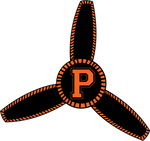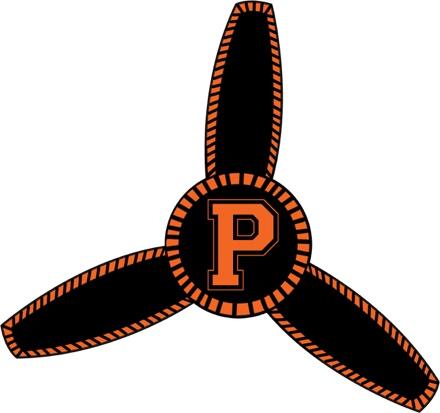September, 2018 Propeller
A PRINCETON PROPELLER EVENT
AT QUADRANGLE CLUB

FOR ENTREPRENEURS,
NAVIGATORS & THE CURIOUS
Please Join Us for Cocktails & Hors d’oeuvres
33 PROSPECT AVENUE – PRINCETON, NJ
6 P, TUESDAY, September 11th, 2018
Speaker: Rich Hollingsworth ’71
Director of Operations, High Asset Tagging, Tego, Inc.
“Radio-Frequency ID in Aerospace, Life Sciences & Beyond:
Collecting, Storing, Managing and Using Intelligent Asset Data”
Managing high value assets, by simple Internet of Things (IoT) connection to “Big Data,” leads to
inefficiencies in handling large volumes of disparate data over long periods (e.g., decades). Asset
identification by reading barcode or RFID EPC and sending to “Big Data” to retrieve asset data is
likewise limiting, where Internet protocols don’t make sense due to cost, latency, or environmental
conditions. But “intelligent assets” use RFID tags with asset data permanently stored on the asset and
read by a simple RFID reader --- eliminating the need for “Big Data.” After describing how Tego delivers
its high memory RFID technology core “intelligent assets” in the aerospace and life science industries,
Rich Hollingsworth will delineate the semiconductor and software development challenges yet to be
met, before “intelligent assets” can be extended to many other industries.
Registration Required via propellers.princetonaaa.org
NEXT PRINCETON PROPELLER: Tuesday, October 9th (6 P)
Posted by tmswift about 5 years ago.
More
June 2020 Propeller
PA3 INVITES YOU TO “SECOND TUESDAYS”
A PRINCETON PROPELLER ZOOM EVENT
UWMA @ QUADRANGLE CLUB

FOR ENTREPRENEURS,
NAVIGATORS & THE CURIOUS
Please Join Us with Cocktails & Hors d’oeuvres
WHEREVER YOU ARE
7 P, EASTERN TIME (USA) -- TUESDAY, June 9th, 2020
Speaker: David Herman, MD
Chair, Infection Control, Penn Medicine Princeton Health
“An Up-to-Date Briefing on COVID-19 Infection:
And Dealing with this Pandemic at the Local Level”
Over the past few months, many of us have expanded our virology and infectious disease awareness.
Likewise, epidemiologists, researchers and front-line health care workers have garnered an enhanced
respect from a grateful public. So, it is with special pleasure that the Propellers welcome Infectious
Disease specialist David Herman for a global perspective on our historic pandemic. In particular, he will
discuss how epidemiologists determine the contagiousness of infectious diseases, then delve into the
different types of laboratory testing for SARS-CoV-2, and their attendant implications for controlling
infection spread. He will then delineate changes Penn Medicine Princeton Medical Center has implemented
in response to COVID-19. You may find his facts bracing, but the power of human resilience will also be on
offer. Please note: Zoom Propellers now reach a national (and global) audience, so it’s important to
register: the first 300 people who sign up by June 7th will receive the “Join Meeting Link” on June 8th.
To Receive ZOOM LINK: Registration Required by June 7th via propellers.princetonaaa.org
NEXT PRINCETON PROPELLER: Tuesday, September 8th (7 P)
Posted by tmswift about 5 years ago.
More
2020 Annual Dinner and Meeting
We welcome as our honored guests Xiyue Wang GS and his wife Hua Qu. Tom Swift '76, PA3's President, will lead a fireside chat with Xiyue and Hua to discuss Xiyue's three-year imprisonment in Iran and the current regime there. Questions will be taken but only if submitted in advance via email.
We will also be electing directors. The event kicks off at 6:30 for casual get togethers; business begins at 7:00 and the Fireside Chat will begin around 7:20. Breakout rooms will be provided at the end of the meeting.
Festive Orange + Black Attire is encouraged
In view of the unusual circumstances this year, we have arranged with Princeton-based Olsson’s on Palmer Square for a Grazing Box with an orange and black theme for PA3 members who may want hors d'ouevres for the meeting. A special Princeton-themed cookie is also available separately. Please make individual arrangements directly with Olssons no later than October 26 at this link.
Registrations can be made here . After registering, you will receive a confirmation email containing information about joining the meeting.
Contact Mo Chen here with any questions.
Related Events
PA3 Annual Meeting (
Thursday, October 29, 2020 - 6:30 PM to
9:00 PM
)
Location: Zoom
Posted by frankederby over 5 years ago.
More
Navigating Your Career During an Uncertain Economy
Center for Career Development, Princeton University
|
|
Princeton Alumni Association of Essex and Hudson Counties (PAAEHs)
|
|
|
|
invite you to join us for a timely event
Navigating Your Career During an Uncertain Economy
Thursday, August 6
8:00-9:00 p.m. EDT
Hear from fellow alumni about how they have navigated their career journeys during challenging economic circumstances, and join the conversation by offering your own hints and tips for thinking about careers during Covid-19. In addition, hear from current students who have benefited from alumni offering virtual internships and projects this summer, and learn how these experiences have impacted their career decision-making.
RSVP to reservation@paaehs.org and you will receive the Zoom link on August 5th
|
Related Events
Navigating Your Career During an Uncertain Economy (
Thursday, August 6, 2020 - 8:00 PM to
9:00 PM
)
Organized by PAAEHs and the Princeton University Center for Career Development
Location: Virtual
Organized by: PAAEHs
Posted by tmswift over 5 years ago.
More
May 2020 Propeller
PA3 INVITES YOU TO “SECOND TUESDAYS”
A PRINCETON PROPELLER ZOOM EVENT
UWMA @ QUADRANGLE CLUB

FOR ENTREPRENEURS,
NAVIGATORS & THE CURIOUS
Please Join Us with Cocktails & Hors d’oeuvres
WHEREVER YOU ARE
7 PM, TUESDAY, May 12th, 2020
Speakers: Steven Peskin, MD; Tom McCarrick, MD;
Howard Baruch, MD & Rod Kaufmann, MD
“COVID-19 Unleashes Telemedicine Innovations:
New Paradigms for Delivering Patient Care”
The arrival of COVID-19 and the pandemic-generated distancing protocols necessitated by it --- have forced a rapid departure from standard medical practice as we have known it: indefinite postponements of elective surgeries; cancellations of routine screenings, lab work, dental care; and elimination of face-to-face, hands-on contact with our cherished family physicians. All replaced, at least for now, by an unfamiliar world of Chat Bot screening tools; algorithm-based query agents like Vicki Vanguard; and remote patient monitoring (RPM) regimens for performing our own self-guided evaluations, under the direction of PA Navigators. On May 12th, our panel of physicians will take us into this unfolding telehealth world and advise how we can get the most from these evolving technologies, with all their attendant pros & cons. They will also address how this is transforming their respective medical practices --- and reconfiguring the doctor-patient relationship.
To Receive ZOOM LINK: Registration Required by May 10th via propellers.princetonaaa.org
NEXT PRINCETON PROPELLER: Tuesday, June 9th (7 P)
Related Events
May 2020 Princeton Propeller (
Tuesday, May 12, 2020 - 7:00 PM to
8:30 PM
)
Location: via Zoom
Organized by: BF Graham
Posted by tmswift almost 6 years ago.
More
